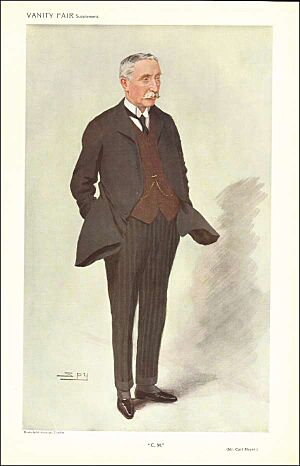Sir Carl Meyer, 1st Baronet facts for kids
Quick facts for kids
Carl Meyer
|
|
|---|---|

A caricature of Meyer in Vanity Fair, 1909.
|
|
| Born |
Carl Ferdinand Meyer
23 December 1851 |
| Died | 18 December 1922 (aged 70) |
| Nationality |
|
| Occupation | Banker, diamond miner |
| Known for | Banking, mining |
Sir Carl Ferdinand Meyer (born December 23, 1851 – died December 18, 1922) was a very important British banker and a leader in the diamond mining business. He was also known for his support of the arts. He was given the special title of Baronet in 1910.
Contents
About Carl Meyer's Life

Carl Meyer was born in Free and Hanseatic City of Hamburg, which is a city in Germany. He was born into a Jewish family. In 1877, he became a British citizen.
In 1883, he married a woman named Adèle Levis. Her father was Julius Levis from Hampstead. Carl and Adèle had two children: a son named Frank Cecil Meyer and a daughter.
A famous painter, John Singer Sargent, painted a portrait of Adèle Levis and her children in 1896. The painting is called Mrs. Carl Meyer and her Children.
Carl Meyer's Work and Achievements
Carl Meyer started his career working for the Rothschild family, a very famous banking family. He was their main clerk and helped them deal with the De Beers mining company.
Later, he went to work directly for De Beers. He became the deputy chairman, which means he was the second-highest leader of the company. He also led the National Bank of Egypt as its governor. He was on the board of many other mining companies too. He was also a board member of the Hong Kong and Shanghai Bank (HSBC).
Supporting the Arts
Carl Meyer loved the arts very much. He often supported opera, music, and theatre. In 1909, he gave a large sum of money, 70,000 pounds, to the Shakespeare National Memorial Theatre. This theatre was later rebuilt and is now known as the Royal Shakespeare Theatre in Stratford-upon-Avon.
Speaking Out During World War I
During World War I, Carl Meyer wrote a letter to The Times newspaper. In his letter, he said he did not agree with the harsh tactics used by the Germans during the war. This included the sinking of the RMS Lusitania, a passenger ship. He felt it was important for people of German origin living in Britain to speak out against such actions.
Images for kids
 | Bessie Coleman |
 | Spann Watson |
 | Jill E. Brown |
 | Sherman W. White |


